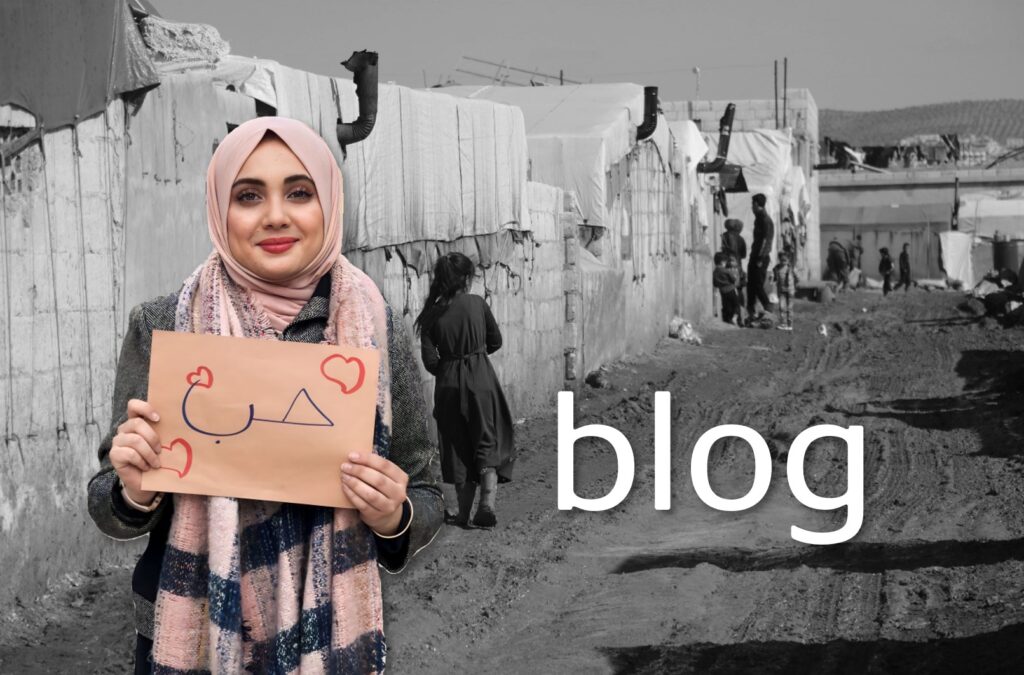Malak Alamar grew up in refugee schools in Jordan and witnessed how refugees have suffered from hate speech and poor living -conditions. Coming from a family with Palestinian roots, she faced the same problem of discrimination before. By identifying the impacts of climate change and the hostile relationship it would create among the people as a major threat to them, she decided to bring young refugees and Jordanians together to find solutions for climate resilience and peaceful coexistence through her organisation Sanaubar.
By Malak Alamar
Early Exposure to Refugee Life
Imagine a couple of years from now: a refugee camp, usually flooded whenever it rains, is now protected by a small pond that functions like a dam. The area is transformed into a beautiful and joyful space for its residents, full of different trees and plants. Children play in the gardens, and the elderly find a place to sit under the shade and enjoy a little breeze. Small patches of grass, tomatoes, and lettuce dot the roofs. And even the walls are covered in vertical vegetable gardens.
“Why are you interested in the fate of refugees at this young age and why do you care about their stories while you are not even a refugee yourself?”
A question I received from the High Commissioner of the UNHCR, right after my speech about refugees in Jordan.
“Yes, you are right!” I replied confidently. Yet inside of me, I was very nervous. “I am not a refugee today, but my family’s roots are in Palestine. When I was young, my grandfather told us about the home he had lost due to unrest in Palestine because of the Israeli occupation which forced him and his family to escape to Jordan. Now, the Syrians are facing similar struggles. We should have empathy for each other because humanity doesn’t coincide with nationality.”
Motivation for Action
From a young age, I grew up with refugees. My mother is working as an assistant principal in a school in the largest Palestinian refugee camps in Jordan and thus, I went to school with refugee children since I was 10 years old. I could witness the life of my friends inside the camp.
I loved reading and writing since childhood. One of my friends shared with me that she heard her teacher saying: “Refugees are not clean, they do not take care of themselves, and their camps are the largest dump sites of waste!” The severity of discrimination was shocking to me.
Vision for Change
In 2015, Aleppo, in Syria was attacked and destroyed, from then onwards, huge numbers of Syrian refugees started to cross the border into Jordan. Due to the rising pressure, lack of resources, and exorbitant prices, Jordanians began to grumble: “They take our jobs and get everything for free! They are living better than us!” I felt sad because I was subjected to discrimination due to my Palestinian roots. During the start of the civil war, I created a blog sharing stories of refugees I had collected throughout my childhood.
Initiatives for Awareness
Next to the rising intolerance of refugees in society, the waste problem inside refugee camps became unbearable. Together with some schoolmates, I initiated “Shama” (candle), to raise awareness by painting pictures on the walls of the school relating to waste, pollution, and environmental destruction.
In the year 2017, I met Farah from Syria in my high school and got to know about her life. A bomb had fallen on her house, killing her mother and costing her brother his feet. Despite all this, she aspires to become a nurse. Her story of sadness and hope inspired me to write my novel, “The Fifteenth Night” since the war started on the 15th day of March 2011.
It was meant as a voice for refugees and telling people about their challenges and dreams. I aimed to raise empathy for the refugees to improve the coexistence between refugees and native Jordanians.
Recognition and Leadership
Turning seventeen I was invited to attend the International Conference on Refugee Affairs as a speaker. I received an honorary title as the youngest representative of refugee affairs in Jordan which allowed me to visit most of the refugee camps in the country. And everywhere I went, I experienced similar problems. Feelings of exclusion, overpopulation, and lack of waste management.
Education and Advocacy
After entering university at the age of 18, I studied law and began to delve deeper into Human rights and environmental action. I realized that refugees are extremely vulnerable to natural disasters and climate change. Due to limited access to resources and difficulties in adjusting to rising temperatures and higher prices. Additionally, global warming will cause further shortages of resources such as water or food. This carries the risk of more conflicts between the refugees and the Jordanian population, which will result in more discrimination and hate speech.
Call to Action
Since climate change is the major risk for the deterioration of the situation in Jordan, I decided to act. I want to work side by side with refugees and Jordanian youth to make them allies in finding solutions to cope with the effects of climate change and improve the coexistence of refugees and Jordanian people in my country.
Have you missed Malak’s Dream Speech at kanthari TALKS? No problem:
you can see it here
If you carry a plan for social change, and are looking to acquire the right tools: then check out the following website and apply today to become a participant:
www.kanthari.org/admissions



